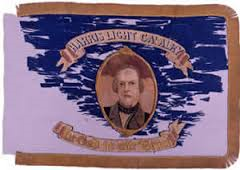On the Way to Falmouth
Lt. Charles Morton, 2nd New York Cavalry, described the events to Falmouth from his perspective:
“About nightfall on Tuesday, the 15th instant, General Augur’s brigade was ordered to advance. The General and his staff preceded the troops, and arrived at Catlett’s Station late at night, after a most disagreeable ride in the darkness, through sloughs and over bad roads, and with keen appetites for the evening lunch at the headquarters of General McDowell.
“General McDowell arrived on a special train at two o’clock, on Wednesday morning, the 16th. The command was halted on that day for the arrival of the supply train and the remainder of General King’s division. In the mean time the rebels placed a field piece upon the south bank of the Rappahannock, and entertained our pickets with frequent shot and shell, without doing any damage.
“On Thursday, with the first light of dawn, the command started. Lieut. Col. Kilpatrick, with the Ira Harris Light cavalry, led the advance. Before starting, an order was issued directing the instant shooting of any one detected in the act of pillaging, burning, or wantonly destroying property. No occasion was found for the execution of the order. Late in the day the heat compelled the men to relieve themselves of every thing not absolutely indispensable, and overcoats and blankets strewed the road.
“Six miles from Catlett’s Station recent tracks of rebel cavalry were discovered. Twelve miles beyond the enemy’s picket was driven in. Gen. Augur pushed rapidly forward with the cavalry and the Brooklyn Fourteenth regiment and a section of artillery. A small rebel mounted force was discovered, which retired skirmishing. The chase continued for eight miles, the Brooklyn Fourteenth, without a single straggler, keeping up with the cavalry and artillery. Lieut. Decker, company D, of the Ira Harris Light Cavalry, was killed while gallantly leading one of the charges. He was shot through the heart. The rebel by whom he was killed and fifteen others were almost at the same instant taken prisoners.”

